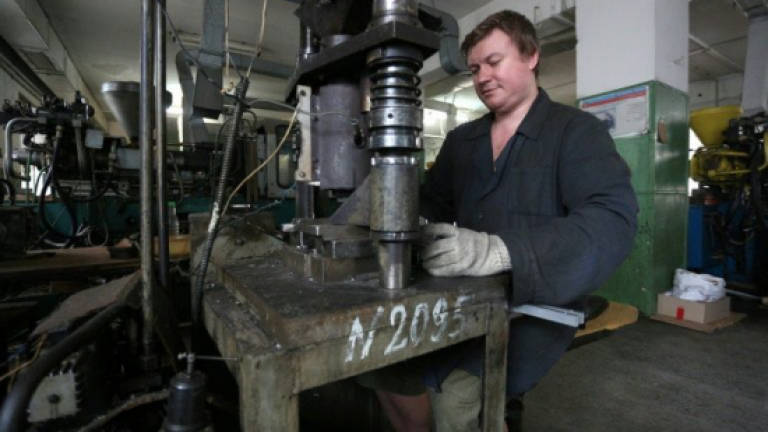Conflict leaves blind in rebel-held Ukraine stuck in dark

PARTIALLY: sighted Georgiy Lukyanov makes his way through the ageing lathes in the factory where he works in rebel-held eastern Ukraine.
The grim, dilapidated eight-storey plant, which produces disposable shoe covers and jar lids for pickles and jams, was set up in 1930 by the Soviet authorities in the industrial city of Donetsk to offer employment to visually impaired people.
"For people like me, this work is the only chance to remain a normal member of society," 54-year-old Lukyanov, who has worked at the factory for 15 years, told AFP.
Before the start of the conflict between Moscow-backed rebels and Kiev forces in eastern Ukraine in 2014, the factory used to employ about 1,500 workers.
But that changed dramatically during the three-and-a-half-year war that killed more than 10,000 people and displaced more than a million.
Two-thirds of Donetsk residents fled in search of a better life and many people with visual impairments joined their families and relatives in other cities.
Many of those who stayed behind became virtual prisoners in their own homes: some were let go or asked to go on unpaid leave, while others began receiving such miserly wages that they simply refused to show up at work.
Surviving without Ukraine help
"Before the war, 1,500 people worked at the factory and now we have 76 people," Lukyanov recalled.
After the area came under control of the Kremlin-backed insurgents, the factory lost its subsidies from the Ukrainian state budget.
"We were funded by Ukraine, but since 2014 all payments were stopped and we survive only when we sell something," Lukyanov said.
The new authorities refused to finance the enterprise, pointing to a lack of funds due to the military expenses of the ongoing conflict.
"We had to look for new customers and buy raw materials in Russia so that we could continue to work and pay salaries," Lukyanov said.
The main problem of doing business in Donetsk is the lack of a legal status in the territory. Most of the official enterprises refuse to conduct business with firms that put on their documents the seal of an unrecognised state.
Salaries for those working at the factory reach around 2,000 rubles (RM145) a month.
But people like Lukyanov appreciate their jobs for an opportunity to socialise with others, he said.
Isolation
Life in Ukraine has never been easy for the disabled. There is almost no infrastructure such as curb ramps or walk signals and companies offering job opportunities to them are in short supply.
But the war in eastern Ukraine delivered an especially wounding blow to its visually challenged residents, isolating them even more.
There are roughly 2,000 visually impaired people estimated to be living in the rebels' self-proclaimed Donetsk People's Republic in east Ukraine.
As the fighting has turned lives across east Ukraine on their head, many have become increasingly unable to negotiate the fraught new world of armed checkpoints and front lines.
One has to pass five checkpoints to get to Ukrainian-controlled territory and there are no public buses that can carry more than eight people at a time.
Locals also need to pass through customs and passport controls and register their vehicles both with Ukraine's military and rebel representatives, which can lead to huge queues.
"When you have vision problems, it's hard to pass the checkpoints without help," said Lukyanov.
'Only the darkness'
At the offices of the Society for the Blind in Donetsk the signs of the current difficulties are easy to spot.
The visually impaired used to come here before the war for special performances or to use the Braille library.
Now though there is an air of neglect as creeping damp and a lack of heating and electricity have taken their toll.
"We have not had any funding for three years already, there are no new books and we cannot even purchase walking sticks for the blind," said the head of the library Leonid Bondar, a 73-year-old pensioner who survives only thanks to his children and grandchildren.
"Our situation today is catastrophic," he added.
The library now only works two days a week and the concerts that used to be staged have long ceased due to a lack of money.
"Our disabled people are left at home," Bondar said.
"And what is a disabled person at home? It means that a person, who does not see anything, sits at home and just looks into the darkness and sees only the darkness." — AFP